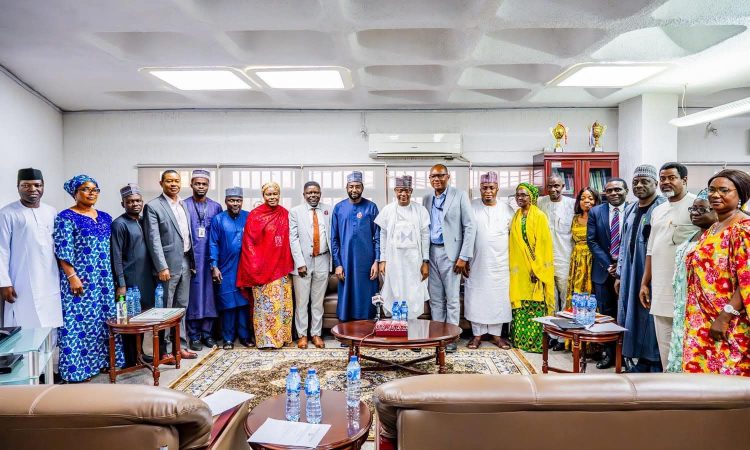
By Angeline Mgbele, Bureau Chief, Northern Nigeria
The National Information Technology Development Agency (NITDA) is partnering with the National Universities Commission (NUC) to install digital literacy as a general course in all Nigerian universities, Cyber Era NG learns.
According to a press statement e-signed by the Director of Corporate Communications and External Relations at NITDA, Hajia Hadiza Umar, the Director-General of NITDA, Mallam Kashifu Inuwa Abdullahi, disclosed this during a courtesy visit to the NUC headquarters in Abuja, north central, Nigeria.
According to Mallam Abdullahi, as per the statement, this collaboration built on the success of the Digital Literacy for All initiative (DL4ALL) implemented at Nasarawa State University, Keffi, north central, Nigeria, and marked a significant milestone in advancing digital skills and preparing Nigeria’s youth for the digital economy.
Abdullahi emphasised that equipping students with essential digital skills through formal education was critical to achieving Nigeria’s digital economy goals and explained that NITDA’s Strategic Roadmap and Action Plan (SRAP 2.0) had 8 pillars, with fostering digital literacy and cultivating talent as a priority.
“We aim to achieve 70 per cent digital literacy by 2027 and 95 per cent by 2030. Embedding digital skills as a general course in universities is a sustainable solution to achieve this target,” he added.
Building on the Nasarawa State University pilot, where digital literacy was introduced as a self learning credit-earning course with support from Cisco, NITDA seeks to replicate the model nationwide.
“With NUC’s support, we can make digital literacy a standard requirement like English and Mathematics, empowering students to navigate and contribute to the digital economy effectively,” said Abdullahi.
Emphasising the role of universities in achieving these goals, th NITDA boss said, “Universities are critical stakeholders, and esearch is the foundation of any robust economy, and we must collaborate to build a technology research ecosystem that addresses national challenges.”
He also stressed the importance of aligning education with industry demands, particularly through The Nigerian Start-Up Act, a legal framework that would nurture entrepreneurial ecosystems. With NUC’s guidance, he explained, universities could tailor their programmes to equip students with high-demand skills, ensuring they graduated as job creators rather than job seekers.
The NITDA DG reiterated the significance of collaboration. According to him, “no one succeeds in isolation. This partnership with NUC is vital for achieving our vision. Together, we can prepare our citizens for the future, bridge the digital divide, and position Nigeria as a global talent hub.”
Following the NITDA DG’s remarks, the Executive Secretary of the NUC, Chris J. Maiyaki, commended the initiative and affirmed the commission’s commitment to driving digital transformation within Nigeria’s university system.
Mr. Maiyaki emphasised the urgency of integrating digital literacy into the university curriculum, stating that, “the rapidity of change in the digital revolution makes a strong case for the Nigerian university system to be part and parcel of this transformation. Digital literacy is one resource with profound impact; you can hardly function today without significant technological skills.”
While acknowledging the challenges faced by Nigerian universities in terms of digital infrastructure, Maiyaki expressed optimism about the partnership, and reaffirmed his commitment towards its full implementation.
“We are very proud of this initiative. It presents huge potential for our university system to key into the rapidly expanding digital landscape. Using digital platforms to enrich our research ecosystem and exploring the possibilities of artificial intelligence are cross-cutting issues that can transform higher education,” he added.






